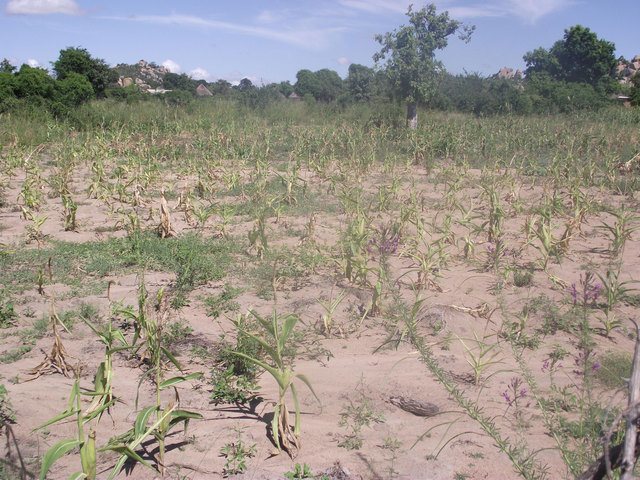
news reporter
ZIMBABWEAN families have run out of options to put food on their tables due to successive droughts as well as rising inflation and the situation is likely to be worse going forward, with projections for poor rainfall and harvests this year, Catholic Relief Services (CRS) has said.
CRS regional director for southern Africa Dorrett Byrd indicated that nearly seven million people across Zimbabwe were at risk of going hungry as a result of successive droughts and rising inflation.
According to the Famine Early Warning Systems Network, Zimbabwe is at a Phase Three food crisis, meaning that acute malnutrition was widespread.
“Families have run out of options to put food on their tables. There have been extensive crop failures and we’re seeing families who have depleted their food supplies. At the same time, families’ savings have been wiped out because of inflation,” Byrd said.
Over the last five years, Zimbabwe has been plagued by recurrent droughts and dry spells.
In a country where more than half the population survives on small-scale farming, that means that families have been forced to cope by using their savings or selling off household assets to buy food, CRS said.
“To cope with what’s happening here, a growing number of young people are migrating from rural areas to urban areas to find jobs, or are leaving the country altogether,” Byrd said in a statement.
- Chamisa under fire over US$120K donation
- Mavhunga puts DeMbare into Chibuku quarterfinals
- Pension funds bet on Cabora Bassa oilfields
- Councils defy govt fire tender directive
Keep Reading
“Migrating parents often leave their young children behind with grandparents who struggle to provide for them.”
To make matters even worse, CRS said families were contending with severe inflation, making their economic situation even more precarious.
Little rains have fallen in the country and livestock is dying due to lack of pastures and water.
A survey by The Standard in several parts of the country revealed that boreholes have dried up in most parts of the country forcing many to walk long distances to find water.
In areas where boreholes still have water, people are forced to wake up in the wee hours of the morning to take turns to fetch the precious liquid.
In agricultural fields, crops are wilting due to prolonged dry spells with some areas having last received rains early last month.
Councillor Lonwell Chipikiri of ward 8 in Mt Darwin said people were starving in the area with the food being provided by the Department of Social Welfare not enough for all households.
“There’s serious hunger here in Mt Darwin. The situation is very bad and if it continues people will die very soon. Every household needs food handouts,” Chipikiri said.
“There’s no rain, our crops are now a complete write-off. Livestock is dying in numbers due to lack of pastures and water to drink.”
In Masvingo, like all other areas, the situation has become dire.
Ward 3 councillor in Chivi South, Ramson Charema, said only 361 households in his area were receiving grain from the Social Welfare department.
“However, the grain is not enough as every household needs food aid. All the inputs went to waste as we last received rain in December. All our boreholes have dried up. As I speak six villages are sharing one borehole which is at a school,” Charema said.
Villagers in Hwange and Binga have also sent an SOS to government and non-governmental organisations for food aid.
“It only drizzled once last year and we haven’t planted anything. There’s no point for government to give us seed and fertiliser now. It would help if that money is channelled to buy grain to give to villagers. What will we use the seed and fertiliser for in this situation, when we don’t have irrigation schemes?” said Chief Sinansen of Binga.
Hwange ward 16 councillor, Cosmas Mwakiposa, said government should provide food aid to every household as no one had been spared by the ravaging drought.
“We have witnessed villagers losing up to 12 cattle per household. Our boreholes have dried up. I have 3 000 households in my ward and only 300 are getting food aid. Government promised to give us seed and fertiliser, but I think it would be better if they give every household grain,” Mwakiposa said.
President Mnangagwa on Friday promised that no one would starve as government was importing maize from overseas.
“We will have enough grain to feed our people. Today is January 3, but we don’t have rains which means it’s another drought. Government is in the process of importing maize from Ukraine, Mexico and South Africa. We have also reintroduced a subsidy on roller meal so it means if the price had risen to $100 it would cost you $50 and we will pay the other $50,” Mnangagwa told a clean-up campaign gathering in Kuwadzana, Harare.
The Catholic Agency for Oversees Development (CAFOD)’s Verity Johnson in a recent report said the impact of cyclones, against a backdrop of years of economic decline had also contributed to the dire situation gripping the country CAFOD said it was starting to receive worrying reports from volunteer health workers that a number of breastfeeding mothers were no longer able to feed their babies because they [the mothers] are malnourished, and not producing milk.
“People are already dying from poor nutrition and disease as health provision fails, but this could substantially increase,” she added, warning of “a prevailing sense of despair”.
Johnson said the situation in Zimbabwe was worse than anywhere else in the world, apart from the Democratic Republic of Congo, South Sudan and Yemen, all of which are conflict zones.
The World Food Programme (WFP) said eight million people, or roughly half the population, are not getting enough to eat WFP plans to double the number of Zimbabweans that it assists, up to 4.1 million, but will require over US$200 million to meet needs in the first half of 2020 alone.










